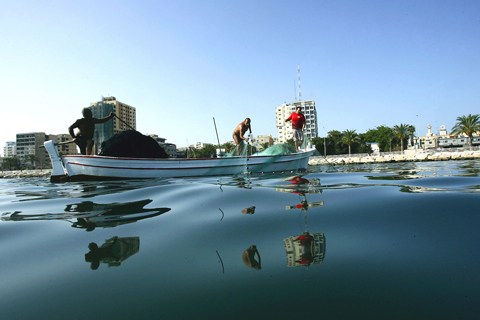Mustapha Shaalan yearns for the days when he would go out to sea and haul in 40kg of fish in the blink of an eye.
Nowadays, like most fishermen in this southern Lebanese coastal town and elsewhere in the country, he says he is lucky if he reels in one or two kilos on a good day.
Over-fishing, pollution and dynamite fishing have all but wiped out marine life in the Mediterranean waters off the 220km long Lebanese coast, leaving many of the country’s estimated 8,000 fishermen destitute.

PHOTO: AFP
“The sea back in the 1960s, 70s and 80s was thick with fish and we were the envy of the town,” 68-year-old Shaalan wistfully recalls, sitting on the quay of the picturesque port of Tyre.
“Our reputation extended worldwide,” said the father of seven who began fishing at age 10 and has a deeply creased, suntanned face from years spent at sea. “My pockets were always full and I traveled a lot. Now, look at us.”
Some 2,000 families live from fishing in Tyre, a city of 100,000 located near the border with Israel, says Khalil Taha, head of the local fishermen’s syndicate.
In the city’s heyday, a fisherman would easily earn US$500 a week, but that figure is now closer to US$200 for an entire month, well below the minimum wage of US$333, Taha said.
“The fishermen of Tyre used to do so well that when they would be offered jobs elsewhere they would turn them down,” he said. “My father used to earn enough from the trade that he was able to put me and my nine brothers and sisters through private school.”
”We used to go and buy our clothes at Nouveautes Khater, an upscale department store,” said Taha, 49, who has two children and is expecting a third. “Now even the cheapest place is expensive for us.”
Taha partly blames the fishermen themselves for their plight but also consecutive governments, which he said have done nothing to protect the fishing industry or help develop it.
Compounding the problem is the constant political turmoil that has rocked Lebanon for years. There was the 1975-1990 civil war, there were Israeli troops in southern Lebanon — including in Tyre — between 1982 and 2000 and, most recently, the devastating 2006 war between Hezbollah and Israel.
“We have been sounding the alarm for more than 10 years about our disastrous situation but no one is listening and I don’t think anyone ever will,” Taha said.
Experts say many species, including red mullet, grouper and small barracudas are facing extinction in Lebanon’s waters, primarily because of bad fishing practices over the years.
“We are destroying our sea, completely and totally,” said Imad Saoud, an aquatic scientist at American University of Beirut. “And the problem is that the people who benefit the most from the sea — the fishermen — are the people destroying it the most.”
He said the illegal and destructive practice of dynamite or blast fishing, spear fishing and compressor fishing, has irreversibly damaged the marine ecosystem off the coast of Lebanon.
Compressors blow air into crevices or holes at the sea bottom, frightening fish out of their hiding places.
Sewage is also dumped at sea along with heavy metals from factories, including copper, zinc and vanadium — a metallic chemical.
In addition, greedy developers have been invading the coastline and paying no heed to the environmental impact.
“The state of the Mediterranean in Lebanon is disastrous at all levels and what is coming is even more disastrous,” said Michel Bariche, a marine biologist at American University of Beirut.
“As far as the government is concerned, even if there is a will to do something, they lack the proper know-how,” he said. “Even if we scientists draw up solutions, there is no chance they will be implemented.”
Bariche said he has been working directly with fishermen to convince them to create marine reserves or protected areas or risk losing their livelihood.
“We need to convince them that these reserves are for their own good, otherwise there will soon be nothing left to fish,” he said.
Most of the fish caught in Lebanon come from Israel and Egypt as drifting larvae, since the currents flow north. Lebanon also imports seafood from Turkey, Egypt and countries in the Gulf region.
Ironically, Taha said, when Israel had its troops stationed in southern Lebanon, there were more fish to catch as fishermen were not allowed to go out to sea at night.
“After the Israelis withdrew, the fishermen went out day and night, leaving no room for the fish to breath,” he said. “A fish can’t lift its head out of the water here without having 20 fishermen go after it.”
Dahej el-Mokdad, head of the department of fisheries and wildlife at the ministry of agriculture, acknowledged that new ground rules are needed on how fishing is conducted in Lebanon but said lack of funds and political bickering have hampered progress.
“We don’t have the means to do our job,” he said. “We don’t even have patrol boats and no one considers our sea as a national treasure.”

‘EYE FOR AN EYE’: Two of the men were shot by a male relative of the victims, whose families turned down the opportunity to offer them amnesty, the Supreme Court said Four men were yesterday publicly executed in Afghanistan, the Supreme Court said, the highest number of executions to be carried out in one day since the Taliban’s return to power. The executions in three separate provinces brought to 10 the number of men publicly put to death since 2021, according to an Agence France-Presse tally. Public executions were common during the Taliban’s first rule from 1996 to 2001, with most of them carried out publicly in sports stadiums. Two men were shot around six or seven times by a male relative of the victims in front of spectators in Qala-i-Naw, the center

Incumbent Ecuadoran President Daniel Noboa on Sunday claimed a runaway victory in the nation’s presidential election, after voters endorsed the young leader’s “iron fist” approach to rampant cartel violence. With more than 90 percent of the votes counted, the National Election Council said Noboa had an unassailable 12-point lead over his leftist rival Luisa Gonzalez. Official results showed Noboa with 56 percent of the vote, against Gonzalez’s 44 percent — a far bigger winning margin than expected after a virtual tie in the first round. Speaking to jubilant supporters in his hometown of Olon, the 37-year-old president claimed a “historic victory.” “A huge hug

Two Belgian teenagers on Tuesday were charged with wildlife piracy after they were found with thousands of ants packed in test tubes in what Kenyan authorities said was part of a trend in trafficking smaller and lesser-known species. Lornoy David and Seppe Lodewijckx, two 19-year-olds who were arrested on April 5 with 5,000 ants at a guest house, appeared distraught during their appearance before a magistrate in Nairobi and were comforted in the courtroom by relatives. They told the magistrate that they were collecting the ants for fun and did not know that it was illegal. In a separate criminal case, Kenyan Dennis

The US will help bolster the Philippines’ arsenal and step up joint military exercises, Manila’s defense chief said, as tensions between Washington and China escalate. The longtime US ally is expecting a sustained US$500 million in annual defense funding from Washington through 2029 to boost its military capabilities and deter China’s “aggression” in the region, Philippine Secretary of Defense Gilberto Teodoro said in an interview in Manila on Thursday. “It is a no-brainer for anybody, because of the aggressive behavior of China,” Teodoro said on close military ties with the US under President Donald Trump. “The efforts for deterrence, for joint resilience